With the fate of NJ sports betting in the courts, the champion of its equine industry isn’t letting the grass grow at Monmouth Park Racetrack
by Laura D.C. Kolnoski • Photos BY Photos BY Amessé Photography
The seasoned equestrian at the helm of picturesque Monmouth Park Racetrack is too busy saving the Garden State’s horse racing industry to fret over doom and gloom gaming prognostications. In fact, it’s near impossible to dampen the optimism of Dennis Drazin.
To him and others, things are looking up at the historic track known as “The Shore’s Greatest Stretch,” opened in 1870 to enhance the area’s summer tourism. Its stately white wood main structure, with its leafy green setting and popular picnic areas, dates to 1946.
Bluegrass mini-golf was added in 2012 as the property underwent upgrades. Last year’s debut of the Blu Grotto Restaurant and Bar under Executive Chef James Corona (of the legendary Doris & Ed’s in Highlands) generated rave reviews. Then there’s the adjacent beer garden with a grill and pizza oven—capable of hosting up to 500 attendees and private events and scheduled to open by Memorial Day.
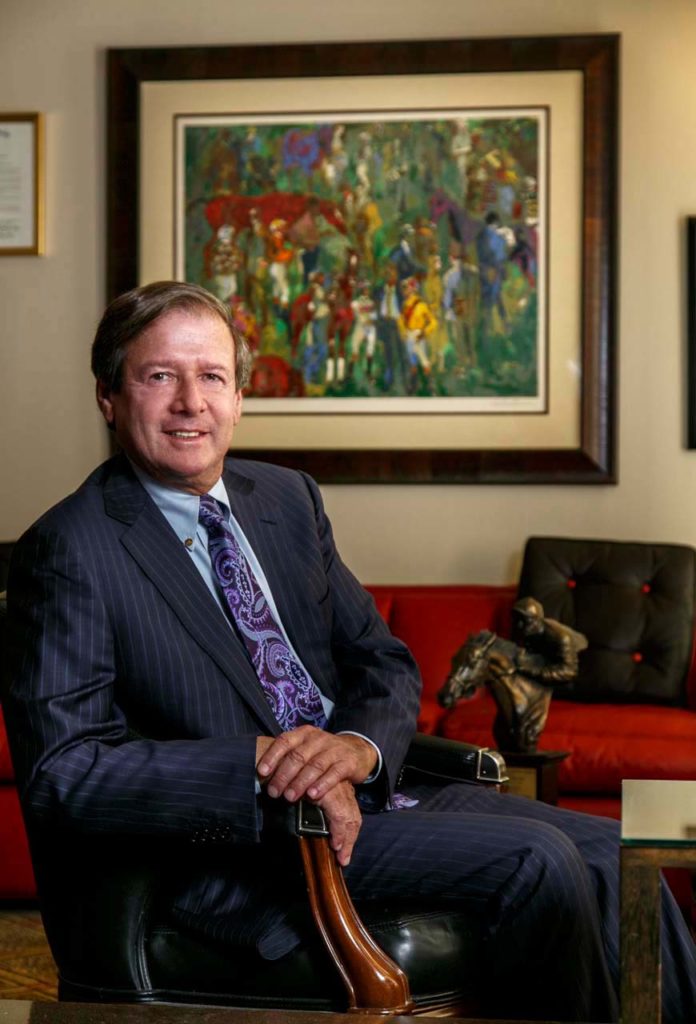
The more revenue is generated at these and other attractions, the more the track can expand its offerings, and that’s exactly what Drazin, an attorney and advisor to the New Jersey Thoroughbred Horsemen’s Association and Darby Development (the operator of Monmouth Park), wants.
“Discussions are ongoing about other amenities,” he said. “Five years ago, we had a master plan, including a concert venue and water park. There isn’t a day that goes by when someone isn’t pitching a concept.” Broad plans are currently on hold, though, awaiting a U.S. Supreme Court decision on sports betting. Hopes were high that the court would hear the case (which could initiate a partial repeal of a federal betting ban) by May, but a more likely ruling date now seems to be during early fall.
“The Third Circuit Court of Appeals said limiting sports betting solely to racetracks and casinos is not acceptable,” Drazin explained about the case. “The Solicitor General filed a brief submitting that New Jersey could repeal sports betting prohibitions in whole or in part. Even if the Supreme Court doesn’t hear the case, we’ve drafted legislation introduced before the state legislature that would enact a full repeal of sports betting prohibitions, which the courts have agreed would be permissible. I’m optimistic that within five years, sports betting will be legal in New Jersey and elsewhere.” The bill’s bipartisan sponsors are Assemblymen Ron Dancer (R-12) and Ralph Caputo (D-28). There are also pending federal bills that would permit sports betting by Congressmen Frank Pallone (D-NJ6) and Frank LoBiando (R-NJ2).
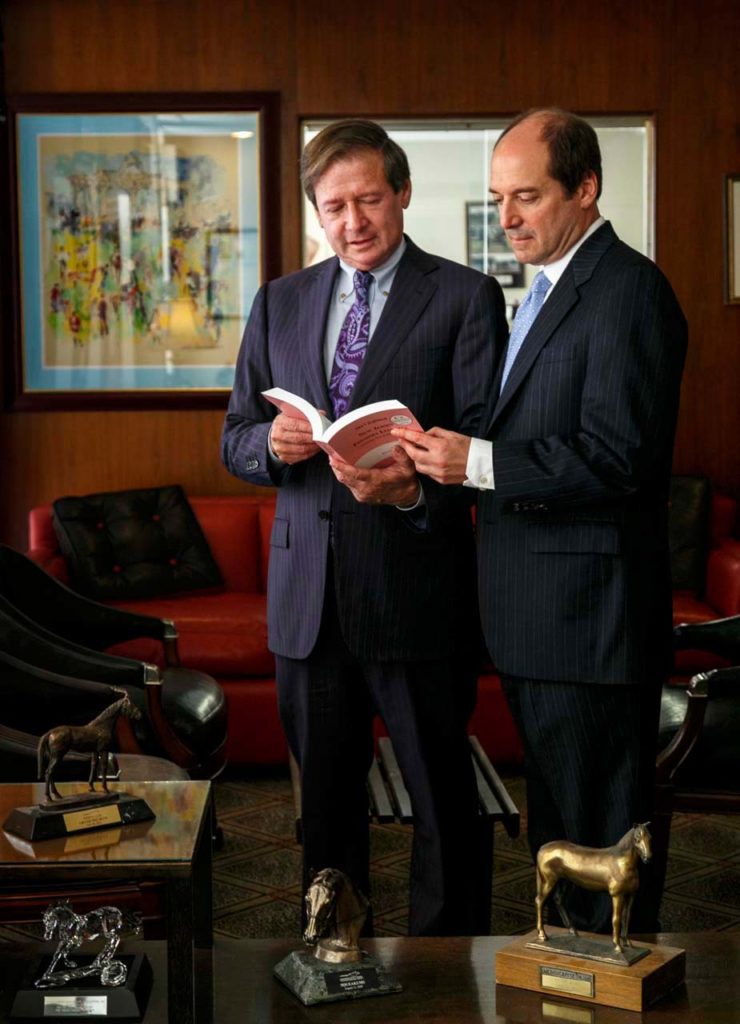
Lower purses and dwindling governmental support have led to the shuttering of horse farms and a growing exodus to friendlier states like Delaware, Pennsylvania, Maryland, and New York. The result is a not only the loss of jobs and revenue, but also of precious open space when farms and stables fall to development.
Equine activities remain, however, a billion-dollar industry, Drazin said, employing trainers, groomers, jockeys, veterinarians, farmers and farm workers, carpenters, and suppliers of equipment, and feed.
“New Jersey has lost maybe half of its horse farms in the past ten years, but it still supports 13,000 jobs and controls 176,000 acres of open space,” he observed. “The jobs and economic impacts begin from when you plant the seed in the ground. When Chris Christie became governor, he decided there would be no subsidies and the racing industry lost $30 million per year.”
In 2014, Drazin published a letter in the New York Times stating, in part, “The major professional sports leagues have argued that legalizing sports betting would hurt the integrity of their games. Sports betting, most of it illegal, is already a $400 billion enterprise. The leagues rail against wagering but benefit from it. Meanwhile the mob rakes it in. There will come a day when sports betting is legalized. In the interim, the illegal market is thriving.”
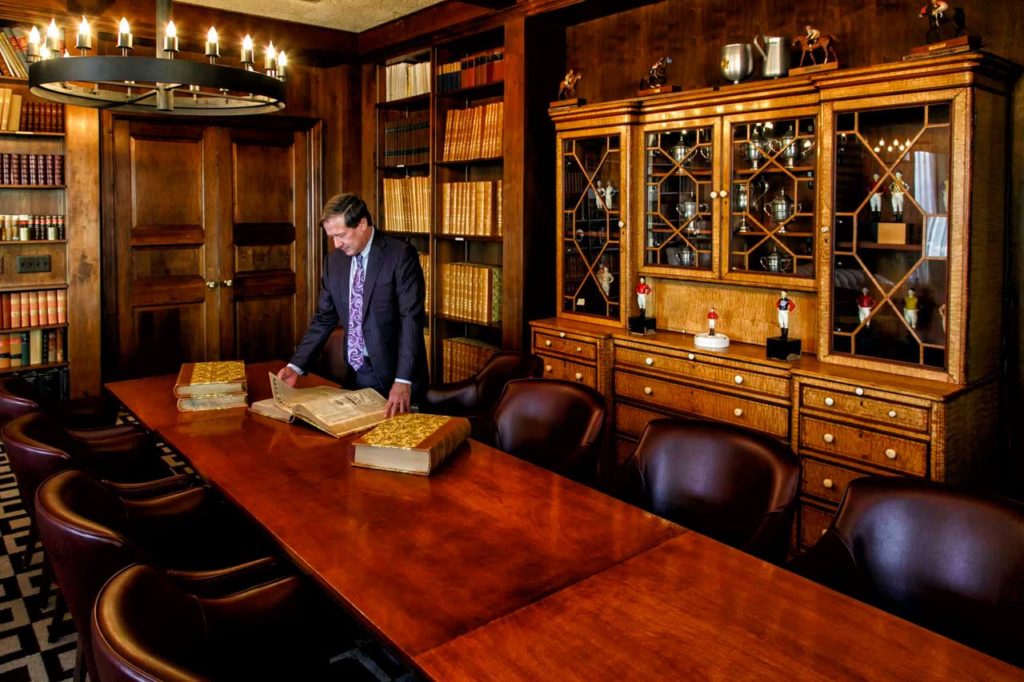
On another front, Drazin noted, “The industry is growing older, so we must look at options to bring in younger generations beyond gambling,” adding that he’d like the track to be open year ‘round.
Introducing food truck weekends, which draw 75,000 people, proved a winning idea. Then there’s the pageantry and excitement of The Haskell, a $1 million signature race returning July 30, and another financial boon. Held after the Triple Crown, it’s the next major race for three-year-olds, and the participation of Triple Crown and Breeder’s Cup winner American Pharoah two years ago generated national publicity, and record crowds of over 60,000. Last year, the first three winners of the Kentucky Derby and the winner of the Preakness ran (Drazin’s horse, Sunny Ridge, came in third, beating the Kentucky Derby winner).
Passage of last November’s failed referendum to allow casino gambling outside Atlantic City would not have permitted the track to add casino gambling.
“Monmouth Park was purposely excluded because any new casino had to be 72 miles from Atlantic City; we’re 71,” Drazin wryly observed. “Details of the referendum weren’t transparent enough in providing details such as tax rates, locations, and how the revenue would be spent, making it easy for the casinos to oppose it. The referendum was doomed to fail from the start.” He speculated that expansion of casino gambling could happen “perhaps via internet cafés at the racetrack.” Other possibilities are gambling on fantasy sports or tournaments like foul-shooting, and increasingly popular, as he explained, “E-sports like video game tourneys, where 50,000 spectators watch kids compete in an arena. “
Inside the main building at the 320-acre track, in-house food offerings have been taken over from the previous catering company. Blu Grotto operators aim to improve the fare, and popular outside consigners will be brought in. The Blu Grotto evolved from an idea by John Forbes, president of the New Jersey Thoroughbred Horsemen’s Association, to add a food concession near the mini-golf facility. Drazin expanded that vision into an upscale, glass-enclosed dining destination, overseeing design, construction, and furnishings in the process.
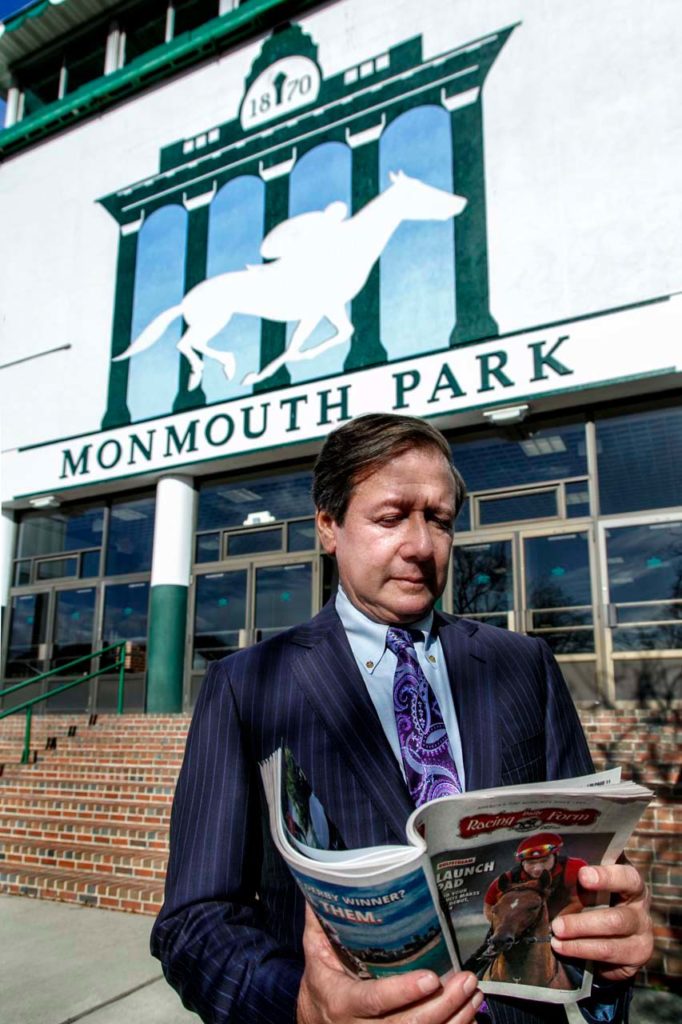
The concept for a restaurant and VIP area was initially part of plans for the concert venue at the track, in partnership with AEG. Drazin said AEG wanted something more “grandiose,” with 3,500 seats under a roof and 4,000 outside on the grass.
“It became a $19 million project,” he said. “We had financing when sports betting looked good, but now that betting is tied up in the courts, it’s on hold.”
In addition to breeding and owning horses for over 30 years, Drazin is an attorney in the firm founded by his late father, Louis M. Drazin, in 1947.
Raised in Rumson, he was introduced to horses by his dad, who began buying racehorses in 1958. In his teens, Drazin frequented the Monmouth backstretch. After graduating from Ohio State University and the Dickinson School of Law, he joined the firm in 1975, followed by his brothers Ronald and Brian. Today, Drazin & Warshaw has offices in Brick, Hazlet, and Red Bank, employing 45, including 12 other lawyers.
The firm built its reputation in part via the elder Drazin litigating the infamous 1951 Woodbridge train derailment, which killed 85 people. Another notable case—involving the 220-acre toxic Kin-Buc Landfill Superfund site in Edison—resulted in a 2005 agreement in which, in addition to funding the cleanup, damages were awarded to over 100 injured citizens exposed to the toxins. The firm’s expertise in “toxic torts” soon became one of its hallmarks.
“We litigated cases to address exploding gasoline tanks, protect children from flammable blankets and clothing, and became involved in environmental law, medical malpractice, drug and product liability, and all types of accidents,”Drazin said. Their efforts led to new case law regarding how polluters are prosecuted by private citizens.
After their father died from multiple myeloma in 1988, the Drazin brothers and their mother, Pauline, established a foundation in his name at Riverview Medical Center. A close family, the Drazin siblings live next to each other in Fair Haven.
“Being in business with your family is the best situation you can have,” Drazin said. “I was fortunate to have a father who built a thriving business, and it was his dream to have his sons join him. We get along great and support each other.”
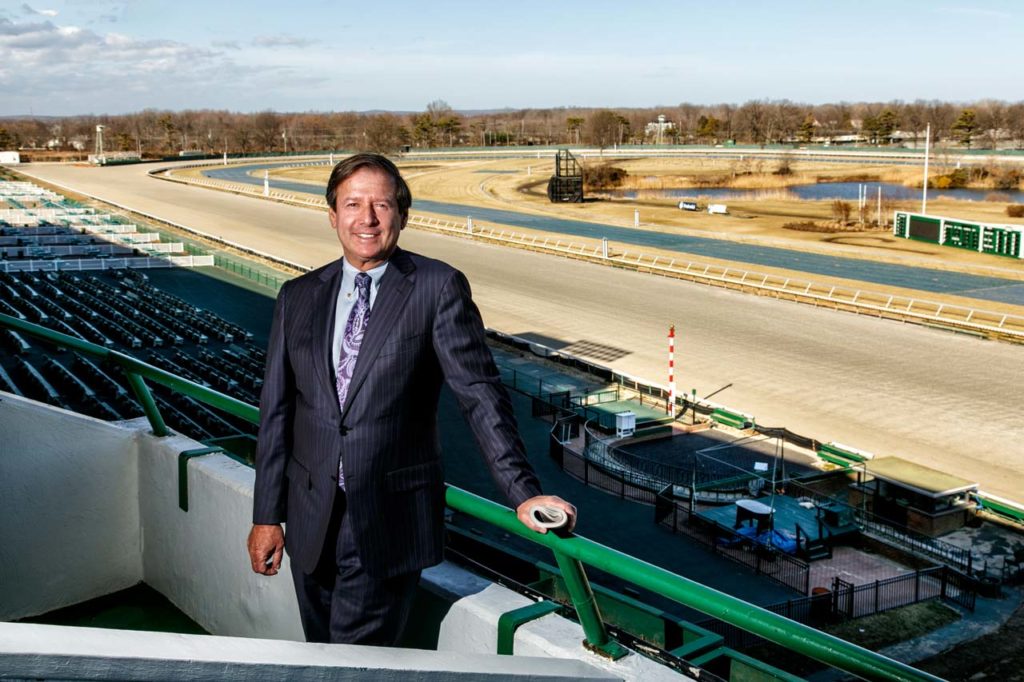
Drazin’s wife, Nona (Balaban), a former president of the Thoroughbred Breeders Association of New Jersey, remains active in the Monmouth Park Charity Fund. She also serves on the Ethics and Institutional Review Board Committees at Monmouth Medical Center. An attorney herself, she also earned a master’s degree from the University of Pennsylvania in bioethics. Known as “The First Couple of Thoroughbred Racing,” they were honored by the Monmouth Conservation Foundation at a gala commemorating New Jersey’s “Year of the Horse” in 2014.
Drazin, a former Chairman of the New Jersey Racing Commission, has received several industry lifetime achievement awards and has been recognized by the State Senate and Assembly. The trailblazer has been hailed as “a natural leader” and “the most powerful person in New Jersey racing” by The Racing Form.
“I take pride in my part in saving this industry, which was in jeopardy when Governor Christie wanted to privatize the track in 2012,” Drazin said. “I feel I’m saving horse racing for future generations. The focus is to ensure we continue to offer a world-class product.”
Monmouth Park Racetrack
Oceanport Avenue, Oceanport
732.222.5100 / monmouthpark.com
